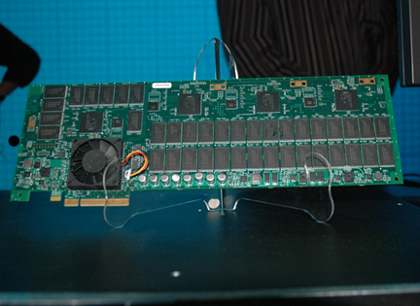Intel predicts imminent SSD mass adoption

At a technical briefing at the Intel Developer Forum in San Francisco on Wednesday, an Intel researcher said mass corporate take-up of solid-state disk drives was almost upon us.
Although most discussion about SSDs has focused on high-performance servers, the breakthrough in adoption would take place in clients because of the cloud model of IT services, according to Christopher Saleski, initiatives manager of Intel's Storage Technology Group.
"Hard disks have the lowest price per gigabyte," Saleski said, "but a high floor cost [the minimum price of a drive, regardless of capacity]. Because of networked software and services, companies can have quite low client storage needs, depending on their IT environments.
"SSDs can be much cheaper for small capacities. We're about to enter an inflection point where, at the right capacity, SSDs will cross the floor price of hard disks, driving mass adoption into the corporate market."
At that point, said Saleski, SSDs' lower power, smaller size and increased robustness would be particularly attractive.
The claim came during a briefing that covered many of Intel's latest findings about the development of SSDs. Knut Grimsrud, Intel fellow and director of storage architecture, said the increasing popularity of SSDs had revealed a number of areas where performance was being compromised by outdated assumptions. "Existing chipsets, interfaces and drivers were all designed with hard disks in mind," he said, "and SSDs are sensitive to very different things."
He quoted examples of plugging SSDs into different apparently identical Sata interfaces on motherboards, which resulted in a 3.5-times performance improvement, with small changes in driver configuration producing equivalent changes. "Driver efficiencies can have small effects on hard disks, but can have a substantial impact on SSDs," he said.
Similarly, Grimsrud added, operating system optimisations for hard disks could actively hinder SSDs. He said Windows 7, which attempts to detect SSDs by their performance rating, reconfigured itself to avoid automatic defragmentation and data pre-fetching — two hard disk techniques that can slow down SSDs and increase their power consumption. "I'm very impressed with Windows 7. It's very encouraging," he said.
Saleski also demonstrated an experimental system, where seven SSDs with PCI Express interfaces were accessed in parallel and delivered over a million data requests per second — a throughput of around 4Gbps — to a dual-socket Intel Xeon 5500 server. "The same performance from hard disks would require some 5,000 devices and would take 50KW," he said. "This setup is taking under 400W."
